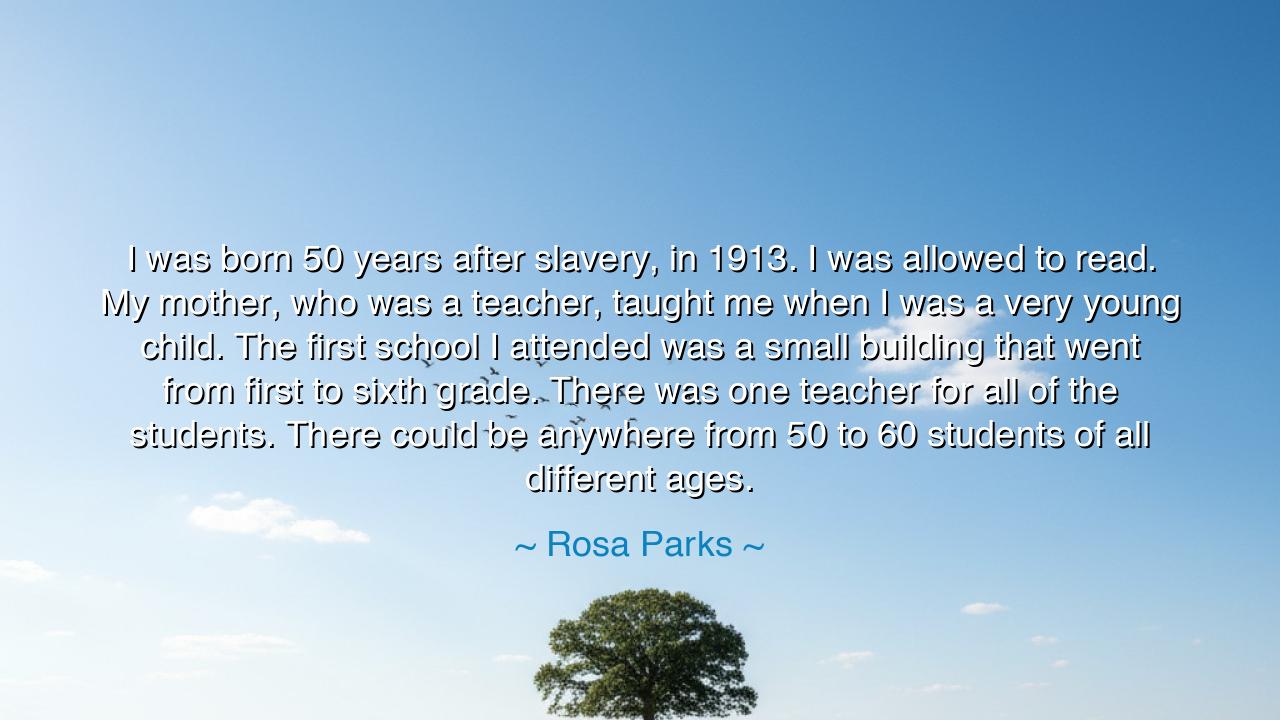
I was born 50 years after slavery, in 1913. I was allowed to
I was born 50 years after slavery, in 1913. I was allowed to read. My mother, who was a teacher, taught me when I was a very young child. The first school I attended was a small building that went from first to sixth grade. There was one teacher for all of the students. There could be anywhere from 50 to 60 students of all different ages.






The words of Rosa Parks—“I was born 50 years after slavery, in 1913. I was allowed to read. My mother, who was a teacher, taught me when I was a very young child. The first school I attended was a small building that went from first to sixth grade. There was one teacher for all of the students. There could be anywhere from 50 to 60 students of all different ages”—are a testimony not only of one life, but of the endurance of a people. They speak of the nearness of slavery, only half a century removed, still casting its shadow upon Black children in America. And yet, they also speak of the power of education, of the resilience of mothers and teachers, and of the hunger for knowledge that no chain could extinguish.
The origin of this truth lies in the long struggle for literacy among the formerly enslaved. During slavery, it was forbidden for many Black people to learn to read, for reading gave vision, and vision gave freedom. To be able to read was to claim one’s humanity, to resist bondage with the strength of the mind. Parks, born in 1913, inherited the fruits of this struggle: the right to read, the right to sit in a schoolhouse, however modest. Her words remind us that such rights, so easily taken for granted, were once fiercely denied and painfully won.
Her story calls to mind the example of Frederick Douglass, who as a boy in bondage risked punishment to learn his letters. He knew that literacy was the path to liberation. “Once you learn to read,” he said, “you will be forever free.” Rosa Parks was born into a world that was still scarred by slavery’s wounds, but she also inherited its triumphs—the mothers who taught their children at home, the teachers who managed classrooms of fifty souls with one voice, the students who walked miles just to hold a book. This was not mere schooling—it was survival, it was hope.
The emotional power of Parks’s memory is found in its contrasts. A small building with so many children, one teacher for dozens of ages, little resources—yet within such humble walls, greatness was nurtured. Parks herself, who would one day become the Mother of the Civil Rights Movement, began in such a place. It was not luxury that raised her, but determination. The presence of a loving mother, herself a teacher, and the dedication of that lone instructor in a crowded room, carried more weight than gold. For in education, it is not wealth that kindles greatness, but devotion.
There is something deeply heroic in this recollection. Parks shows us that even in hardship, education is a light that cannot be extinguished. Where there is one teacher, there is the seed of change. Where there is one child who learns to read, there is the possibility of transformation. From the one-room schoolhouse of her youth grew the courage that would one day refuse to give up her seat on a Montgomery bus, sparking a movement that shook the world. Her early education was not simply in letters, but in perseverance, in the sacred duty to rise above limitation.
The lesson for us is clear: never despise humble beginnings, and never take lightly the gift of education. What seems small—one mother teaching her child at home, one teacher guiding sixty students—can shape the destiny of nations. And just as Parks looked back with gratitude on being "allowed to read," so must we look forward with responsibility to ensure that no child is denied learning, dignity, or hope.
What, then, shall we do? Let us honor the teachers who labor even in difficulty, knowing that their work may shape a Rosa Parks, a Frederick Douglass, a leader yet unseen. Let us support schools and students wherever they are found, no matter how poor, no matter how crowded, for within them lies the seed of greatness. And let us pass down the reverence for education to our own children, teaching them that reading and learning are not only skills, but acts of freedom, acts of resistance, acts of power.
Thus, Rosa Parks’s words stand as both remembrance and command: education is liberation, and even the humblest classroom can birth heroes. The chains of ignorance are heavier than iron, but the key of knowledge is simple and small, passed from teacher to child, from mother to daughter. And when it is used, the human spirit, like Rosa Parks herself, learns not only to endure but to rise.






AAdministratorAdministrator
Welcome, honored guests. Please leave a comment, we will respond soon